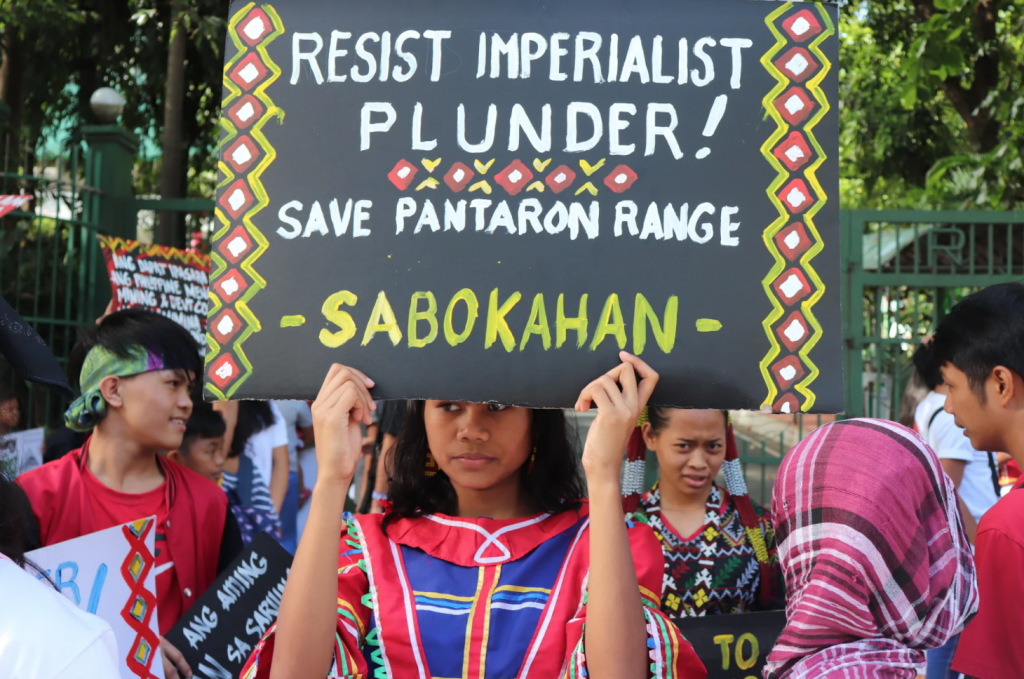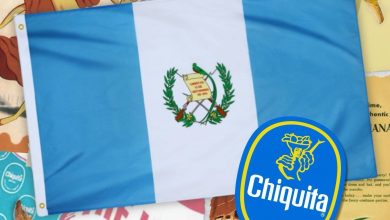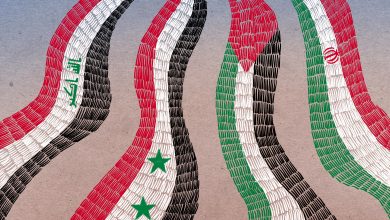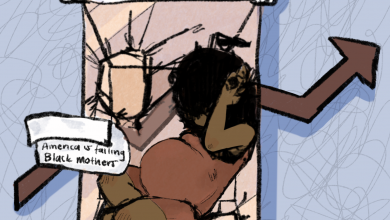Land to the Tillers: Neocolonial Land Grabbing in Mindanao
Article Submission by Liyang Network USA

As the COVID-19 pandemic sweeps the Philippine archipelago, a worsening economic and health crisis brought upon by the government poses a grave danger to its three major regions: Luzon, Visayas, and Mindanao. President Rodrigo Duterte’s public threat to murder any Filipino citizen who “causes trouble” by violating the government’s hastily imposed quarantine has garnered the attention of the intenational media. The Philippine government’s militaristic agenda, coupled with their failure to issue any protective measures, policies, or consideration to its citizens, ensures that the number of lives lost due to the pandemic will continue to climb unless drastic change is enacted at a national level.
While the effects of the government’s militarized response are being felt across the archipelago, rural and Indigenous communities on the island of Mindanao are experiencing the compounding effects of negligence from the Philippine government, increased militarization of civilian communities, forced displacement, and the continuation of feudal land policies and land theft. Like these land policies, a lack of adequate media attention paid to the region of Mindanao is characteristic of a colonial legacy that allows agricultural workers, peasant farmers and Indigenous people to suffer at the hands of the neocolonial Philippine government and the foreign extractive industries perpetuating the widespread plunder of natural resources.
We need not look any further than the Pantaron Mountain Range, southern Mindanao’s ecological backbone, where the Philippine Mines and Geosciences Bureau (MGB) has granted exploration permits to foreign mining companies, including: Compostela Valley Minerals, Inc., Metal Ores Consolidated and Phil Meng Di Mining and Development Corporation. Meanwhile, in the heart of Mindanao, four hydro-electric dams have been built on the Pulangi River, a major tributary of the Rio Grande of Mindanao, supplying water to much of southern Mindanao’s rural and urban communities. Under the government’s predatory Build, Build,Build infrastructure project, touted as a solution for the deepening economic crisis, the Pulangi V hydro-electric dam threatens to flood thousands of acres of Indigenous land, drastically changing the landscape of the region as it threatens the livelihood of over 40,000 people.
As we enter into a future ridden with both mounting insecurity and liberatory potential, let us not turn our backs on the Lumad schools under attack in Mindanao, where a blueprint for the future has already taken shape. Although 161 out of 215 Lumad schools have been violently shut down by the Philippine government and its paramilitary forces, Indigenous teachers and students continue to practice sustainable organic agriculture, developing scientific, relevant techniques to achieve food sovereignty. The Department of Agriculture’s newly proposed Plant, Plant, Plant program aims to convert ‘idle Indigenous ancestral lands into food production farms in order to feed the nation.
In a recent statement, Sabokahan Unity of Lumad Women, a grassroots organization composed and led by Indigenous women in Mindanao, pushed back: “Disguised as government aid, the Plant, Plant, Plant program only offers poor farmers and Indigenous peoples loans rather than subsidies. Why should we take on debt just to eat when we are capable of growing our own food? What we need is land, not loans!”
Rather than supporting the food security initiatives and self-reliance of Lumad communities and schools, the Philippine government’s Plant, Plant, Plant is the latest ploy in a government scheme to further the ongoing theft of Indigenous land and subjugation of peasants and farmworkers to slave-like labor conditions. As we draw inspiration from Lumad models of education and self-determination, we must also be wary of and take action against government opportunism that threatens their very existence.
Indigenous Dispossession & Labor Exploitation Under COVID-19
Although claiming to meet the transportation needs of the Filipino people, Build, Build, Build, and other World Bank-funded projects serve primarily to fill the pockets of the U.S., the rest of the so-called first world, and ruling corporate interests. Within its borders, the U.S. is similarly prioritizing profit over the livelihoods and health of its population. As homelessness worsens, essential workers are forced into unsafe working conditions, and communities suffering disproportionately from racial and wealth inequality are being hit the hardest with COVID-19. While the pandemic continues to devastate dispossessed communities across the US, mass evictions, ICE raids, and gentrification in urban centers are expected to rise.
Indigenous peoples are being dispossessed of their land at an intensified rate, during a time in which more and more people are looking toward Indigenous knowledge for means of survival. Across the world, from the Chamorro people fighting the increased U.S. military presence on their territory, to the Lumad resisting the encroachment of multinational extractive industries on their ancestral lands, to the Mashpee Wampanoag whose land was taken out of trust by the US federal government, corporate interests and government collusion pose the biggest threat to the world’s biodiversity, 80% of which is stewarded by Indigenous peoples.
While Indigenous people in Mindanao have reported being barred from utilizing their own lands under the enhanced community quarantine, plantation workers are being forced to work without adequate protection. In the US, the Trump administration announced its intention to ban all immigration due to the pandemic, making an exception for the migrant farmworkers facing the threat of starvation, illness, and deportation in a country that relies on their labor to put food on their plates.
Deemed both essential and expendable, farmworkers in the US are forced to work without personal protective equipment as the Trump administration works to slash their wages even further below the poverty line. In the Philippines, farm workers earn as low as 120 pesos a day and child farm workers aged 10 to 12 earn 40 pesos, working millions of hectares plantations to produce raw export materials for consumption abroad. Who enjoys the fruits of their labor?
Toward Genuine Food Sovereignty & Self-Determination
While governments claim to provide COVID-19 relief, people’s daily lives shed light on reality: COVID-19 efforts in the US & Philippines are geared toward advancing corporate interests, from Wall Street bailouts to the latest move by the Philippine government to convert ancestral lands into agri-business plantations under Plant, Plant, Plant. In the U.S., incarcerated people are forced to work for pennies on the hour, assembling essential products like hand sanitizer and personal protective equipment, at the same time that they face higher death rates than any other group of people in the country. In detention centers, migrants are brutalized for demanding decent food, as well as for making their own masks after being denied personal protective equipment by their facilities.
The Philippine government’s touted solution to the COVID-19 related food crisis reeks of neocolonialism.Why should the government be trusted, when the over 7 million hectares of farmland in the country have been converted into large-scale plantations and private farms through brutal force and deception throughout history? Rather than implementing rural industrialization in order to feed the population, the Philippine government continues to choose corporate interests, opting to implement Build, Build, Build infrastructure programs, facilitating the production and transportation of raw export materials like rubber, pineapple, cavendish banana, oil palm, cacao, and sugarcane for foreign profits and consumption. The Filipino people, on the other hand, chronically face starvation and landlessness, and are forced to work on plantations in order to afford even the cheapest junk food. Junk food which is imported from the same countries reaping the benefits of slave-like labor. Rather than implementing policies to reverse these economic inequalities, the Philippine government facilitates the widespread exploitation of its own people through projects like Build, Build, Build and Plant, Plant, Plant.
When governments fail to act in the interests of the public, we know that people take action to ensure the survival of their communities, from the movement to reclaim abandoned homes led by Black mothers in Oakland, to mutual aid networks working to connect people with resources like medicine and makeshift masks, to the incarcerated people putting their lives on the line to expose the true conditions within the walls of the prison.
Just as speculators and profiteers hold a monopoly on housing across the US, so do landowners in the Philippines. In Mindanao, where the most fertile land is monopolized by agri-business plantations and large scale mining ventures, about 500,000 hectares of land are covered with agricultural plantation crops primarily for the export market, while another 100,000 are targeted for oil palm expansion by 2022. Government policy like the Integrated Forest Management Agreement and the National Greening program, despite their deceptive titles, prioritizes profits made from high value timber for foreign production rather than food production and sustainable farming to feed the country’s people.
As communities across the US compile and redistribute resources on a local level and campaign for the rights of incarcerated people and migrant farmworkers on a national level, peasants and Indigenous people in Mindanao are calling for a deglobalization and relocalization of their food systems. Without the interventions of military forces and profit-driven corporations, rural communities in Mindanao are confident in their ability to steward the land in order to systematically meet the most urgent needs of the Filipino people: “the Duterte regime does not seem to know how to properly respond to a public health and food crisis. Whether on our lands or in UCCP Haran evacuation, we are already creating local sustainable food systems from communal farms to urban gardens,” according to Sabokahan Unity of Lumad Women.
How can genuine food sovereignty and self-determination be won in the US without an investment in the return of land to its tillers across the world? From Indigenous people stripped of their ancestral lands to make way for mining projects, to peasant farmers living in poverty as they harvest products that end up in our supermarkets, the issue of land justice in Mindanao is one that must be woven into the fabric of our movements in order to realize a truly just vision of our future.
Liyang Network is a local to global advocacy network that amplifies the calls to action of Lumad (Indigenous) communities in Mindanao, Philippines on the frontlines of environmental protection. By weaving together our diverse experiences, skills and resources, we unite in their active defense of land, livelihood and self-determination. Find them online at liyangnetwork.org and on social media.
Sabokahan Unity of Lumad Women is a Indigenous women’s grassroots organization based in Mindanao, Philippines. Sabokahan aspires for the equal respect and recognition of Indigenous women’s rights, capacities, and leadership in the overall struggle of the Indigenous peoples for the right to life, ancestral land, and self-determination manifested in their own governance and development of their territories and affairs; and in general for the emancipation of all class, gender, race, and sectors from all forms of oppression and exploitation. Find them online at sabokahan.org and on social media.




